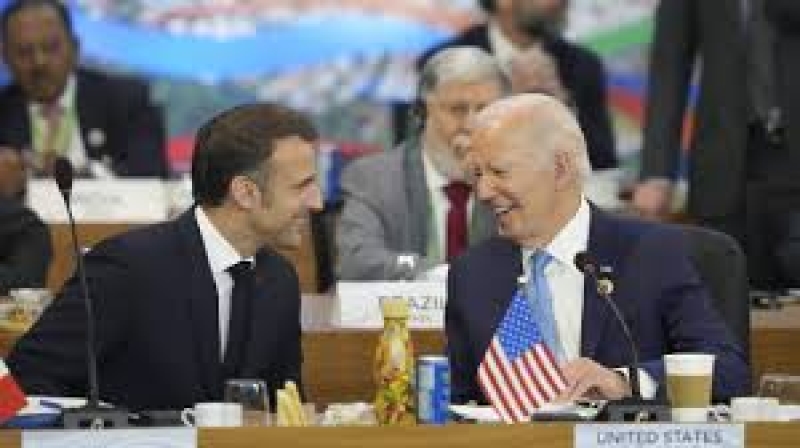- Yunus Urges Voters to Shape a ‘New Bangladesh’ |
- Bangladesh Polls: Campaign Ends as Voters Weigh Pledges |
- Bangladesh Heads to First Gen Z-Driven Competitive Poll |
- EC Lifts Mobile Phone Ban, Bars Photos Inside Booths |
- Youth participation vital to BD’s democratic future: C’wealth Group |
Biden, Macron to Announce Israel-Hezbollah Ceasefire

U.S. President Joe Biden and French President Emmanuel Macron are expected to announce a ceasefire between Hezbollah and Israel, according to four senior Lebanese sources.
White House national security spokesperson John Kirby indicated progress, stating, “We’re close,” though he cautioned, “nothing is done until everything is done.” France confirmed significant advances in the discussions, while Israel's cabinet is set to convene Tuesday to approve the proposed deal.
Despite diplomatic strides, heavy Israeli airstrikes targeted Hezbollah-controlled areas in Beirut on Monday, marking another escalation in the conflict that began over a year ago. The strikes killed at least 31 people and wounded 62, according to Lebanon’s health ministry, while Hezbollah launched a massive rocket barrage into Israel over the weekend, firing 250 missiles.
Diplomatic Breakthrough
The proposed truce reportedly includes Israel's withdrawal from southern Lebanon and the deployment of regular Lebanese army troops to the border region within 60 days, traditionally a Hezbollah stronghold. Disagreements over monitoring compliance have been resolved with the creation of a five-country oversight committee, including France and chaired by the United States.
Elias Bou Saab, Lebanon’s deputy parliament speaker, stated there are "no serious obstacles" to implementing the U.S.-brokered agreement, unless Israeli Prime Minister Benjamin Netanyahu changes course.
Hostilities Persist
Israeli airstrikes have devastated Hezbollah-controlled areas, killing key commanders, including leader Hassan Nasrallah. Lebanon reports over 3,750 deaths and over a million displaced since the conflict began. Meanwhile, Hezbollah attacks have killed 45 civilians in northern Israel and the Golan Heights, while 73 Israeli soldiers have died in the fighting.
The ceasefire discussions aim to restore conditions set by UN Resolution 1701, which ended the 2006 Lebanon-Israel war. However, mistrust lingers, with both sides accusing each other of past violations.
Political Divisions in Israel
The truce could expose rifts within Netanyahu’s government. Far-right National Security Minister Itamar Ben-Gvir has urged Netanyahu to reject the agreement, insisting the conflict continue until “absolute victory” is achieved.
As Biden’s administration pushes for a diplomatic resolution in Lebanon, efforts to address the parallel conflict in Gaza remain stalled. The outcome of the Israel-Hezbollah truce could determine the region’s next steps in navigating these simultaneous crises.

